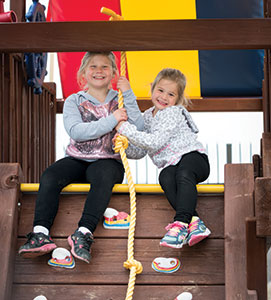Dr. Pahlavan is a licensed clinical psychologist and clinical director of the child and adolescent day treatment and partial hospitalization services at Rogers Behavioral Health.
Attention Deficit Hyperactivity Disorder (ADHD) is a condition that is often first noticed during the preschool and early school years. One of the most common childhood disorders, ADHD affects 5 to 8 percent of school age children.
 What is ADHD?
What is ADHD?
ADHD symptoms can be categorized into two groups: inattention and hyperactivity and impulsivity. In early childhood, these behaviors are common; however, in children with ADHD these behaviors occur more frequently and are more severe. Some of these characteristics may be:
- Highly distracted
- Losing and forgetting things
- Always on the “go”
- Difficulty sitting still
- Easily bored
- Lack of self-control
- Difficulty waiting for turn/standing in line
- Daydreaming or “zoning out”
These difficulties can be observed in free play settings, but as the child grows and is required to show focused attention on tasks, such as school work, the symptoms may be seen more frequently. With ADHD, hyperactivity/impulsive behaviors are often noticed in early childhood, while inattentive behaviors become more apparent when a child enters school.
How is ADHD treated?
While the most recognized method of treating ADHD is through medication, successful ADHD treatment is multidimensional and includes evidence-based therapeutic techniques. The two most important elements of treatment include medication management and behavior therapy.
When first diagnosed there may be a process of trial and observation to determine the right medication and dosage; however, 70 to 80 percent of kids have an excellent initial response. The most common medications prescribed for ADHD are stimulants. While it seems odd, the drugs stimulate the areas of the brain that are responsible for attention and impulse control and help a child to focus.
In addition, behavior therapy can be used to address specific behaviors or teach a child new skills to help him or her manage their behavior. For example, therapy may include social skills training to improve communication, interpersonal skills or self-esteem.
Another facet of behavior therapy can include parent-child interaction therapy (PCIT) which teaches parents how to encourage desired behaviors and minimize the impulsive or inattentive ones.
As a parent, how can I help ensure success for my child with ADHD?
Children with ADHD may have a more difficult time during the school year than children without ADHD. The following are some suggestions for parents to help the school year go smoothly and successfully:
- Create a routine – a chart or outline of activities and times that your child can see provides familiarity and comfort.
- Stay organized – highlight important things on a calendar or cork board, plan the night ahead by laying out clothes, shoes and backpacks.
- Communicate – with the school and your child’s teacher. Discuss the diagnosis and ask for the teacher to provide updates on how your child is doing in the classroom.
- Connect – with your child. Encourage them, teach them to reward themselves, understand their needs and offer support.
If your child’s behavior makes you question if it is ADHD or just a normal part of growing up, begin by talking to your child’s teacher, many times they will be the first to notice. A pediatrician is another option and can even recommend you to a mental health professional that has expertise in ADHD.
Sources: Child Mind Institute


